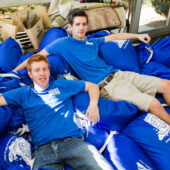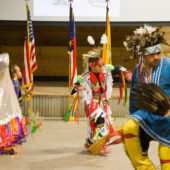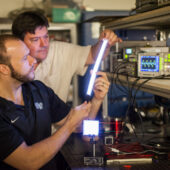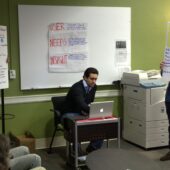2012 Highlights: Mentoring
 It could be the motto that we hold so dear: Pro Humanitate. Or the enviably low student-teacher ratio of 11 to 1. Or the teacher-scholar tradition that our faculty embraces. Whatever the reason, mentoring at Wake Forest goes to a whole new level. Read some of the best stories from 2012.
It could be the motto that we hold so dear: Pro Humanitate. Or the enviably low student-teacher ratio of 11 to 1. Or the teacher-scholar tradition that our faculty embraces. Whatever the reason, mentoring at Wake Forest goes to a whole new level. Read some of the best stories from 2012.
 Using an online computer game that simulates the spread of an infectious disease among its players, researchers learned more about what motivates people to protect themselves from infection.
Using an online computer game that simulates the spread of an infectious disease among its players, researchers learned more about what motivates people to protect themselves from infection. Humanistic inquiry is at the heart of Wake Forest's liberal arts tradition. Together, faculty and students bring to life scholarly and undergraduate research, campus and community programming, and interdisciplinary activities that connect the humanities with science, social science and artistic fields. Here are some of last year's highlights.
Humanistic inquiry is at the heart of Wake Forest's liberal arts tradition. Together, faculty and students bring to life scholarly and undergraduate research, campus and community programming, and interdisciplinary activities that connect the humanities with science, social science and artistic fields. Here are some of last year's highlights. Wake Forest students come from a wide range of backgrounds, and each has unique experience in the University's liberal arts setting. From service trips, to studying abroad, to campus traditions, these student storytellers present a personal view of what it means to be a Wake Forester.
Wake Forest students come from a wide range of backgrounds, and each has unique experience in the University's liberal arts setting. From service trips, to studying abroad, to campus traditions, these student storytellers present a personal view of what it means to be a Wake Forester. Entrepreneurship and social enterprise is Wake Forest's largest and fastest-growing minor. From students starting their own companies, to developing organizations that help others, the entrepreneurial spark is strong on campus. Here are some of this year's entrepreneurship highlights.
Entrepreneurship and social enterprise is Wake Forest's largest and fastest-growing minor. From students starting their own companies, to developing organizations that help others, the entrepreneurial spark is strong on campus. Here are some of this year's entrepreneurship highlights. Where diversity and inclusion are valued, a community is at its best. By celebrating various cultures, religions and ethnicities, we grow as global citizens. At Wake Forest, activities and events remind us to encourage one another to reach our full potential.
Where diversity and inclusion are valued, a community is at its best. By celebrating various cultures, religions and ethnicities, we grow as global citizens. At Wake Forest, activities and events remind us to encourage one another to reach our full potential.  When technology developed at Wake Forest tops The New York Times Magazine's "32 Innovations That Will Change Your Tomorrow," you know the University takes scientific research seriously. Advances in regenerative medicine, drug discovery and treatment methods, and everyday lighting solutions provide just a snapshot of what's happening at Wake Forest.
When technology developed at Wake Forest tops The New York Times Magazine's "32 Innovations That Will Change Your Tomorrow," you know the University takes scientific research seriously. Advances in regenerative medicine, drug discovery and treatment methods, and everyday lighting solutions provide just a snapshot of what's happening at Wake Forest. Regardless of major or concentration, writing skills are crucial for college students. The Writing Center at Wake Forest offers all students tutoring from their peers with the goal of creating a lifelong facility for personal and professional communication.
Regardless of major or concentration, writing skills are crucial for college students. The Writing Center at Wake Forest offers all students tutoring from their peers with the goal of creating a lifelong facility for personal and professional communication. In the quest to build a better mousetrap, the usual approach would include schematics, engineering and experimentation – generally following the scientific method. But if you put on your “design thinking” cap, you might ponder these questions: What attracts mice? Is catching them the solution?
In the quest to build a better mousetrap, the usual approach would include schematics, engineering and experimentation – generally following the scientific method. But if you put on your “design thinking” cap, you might ponder these questions: What attracts mice? Is catching them the solution?